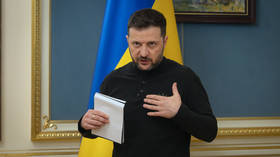Ukraine conflict damaging EU tourism

The conflict between Moscow and Kiev has severely affected EU tourism in a market that was recovering from the Covid-19 slump, a major report shows.
The loss of Russian and Ukrainian tourists, a drop in consumer confidence, and increased travel costs, all stemming from the conflict, have severely hit some of the bloc’s tourist destinations, according to a major European Travel Commission (ETC) study published in September.
Prior to the outbreak of the Ukraine conflict in February 2022, Russian and Ukrainian outbound tourism accounted for 3% ($14 billion) of global spending in the industry, the study says. In Europe, Russian tourists made up 10-20% of incoming business in neighboring countries such as Latvia, Lithuania, Estonia, Finland, and Moldova, as well as coastal destinations like Türkiye, Montenegro, and Cyprus.
Cyprus, the report notes, has suffered especially, losing nine-tenths of its Russian tourists – its second biggest market – and entirely losing the Ukrainian market. Finland lost its biggest tourist market in Russian tourists, causing “extreme difficulties for businesses, especially in the eastern part of the country,” the report says. Bulgaria similarly lost two of its priority markets, Russian and Ukrainian tourists.
The wider impact of the conflict was felt in slower economic growth, higher inflation, interest rates, higher oil prices, and the resulting hike in transportation costs, the report suggests. This was accompanied by lower demand for Europe as a travel destination due to the area being perceived as unsafe, especially for US and Canadian tourists, it adds.
Prior to the Ukraine conflict and the Covid-19 pandemic and subsequent travel limitations, Europe was the most popular tourism destination for Russians, official statistics show. Finland and Estonia were the most popular EU destinations for Russians in 2019, followed by Germany, Italy, and Poland, according to outbound border crossing statistics from the Federal Security Service (FSB), as quoted by the media.
Russians have traveled to Europe 13 times less in the first half of 2024 than in a similar period in 2019, recent FSB statistics suggest.
These statistics do not only include tourist trips, and do not include Russians arriving via other countries.
After the Ukraine conflict began, the European Council fully suspended the Visa Facilitation Agreement it had with Russia. This complicated the visa application process for Russians and made it more expensive. Some European states have stopped giving tourist visas to Russians entirely.














